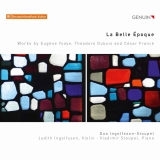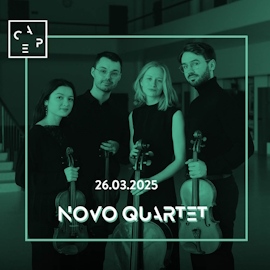 La Belle Époque; Eugène Ysaÿe: Poème élégiaque für Violine & Klavier op. 12; Théodore Dubois: Violinsonate A-Dur; César Franck: Violinsonate A-Dur; Duo Ingolfsson-Stoupel; 1 CD Genuin GEN19674; Aufnahme 03/2019, Veröffentlichung 11/2019 (69'16) - Rezension von Remy Franck
La Belle Époque; Eugène Ysaÿe: Poème élégiaque für Violine & Klavier op. 12; Théodore Dubois: Violinsonate A-Dur; César Franck: Violinsonate A-Dur; Duo Ingolfsson-Stoupel; 1 CD Genuin GEN19674; Aufnahme 03/2019, Veröffentlichung 11/2019 (69'16) - Rezension von Remy Franck
Eugène Ysaÿe hat sieben Poèmes komponiert, hauptsächlich für Violine und Orchester, eine Form, von der gesagt wird, Ysaÿe habe sie erfunden. Das erste davon, Poème élégiaque, für Violine und Orchester bez. Klavier ist Gabriel Fauré gewidmet.
Das rhapsodisch-romantische Werk wird vom Duo Ingolfsson-Stoupel mit einer guten Mischung aus inniger Lyrik und Leidenschaft gespielt. Besonders in den ruhigen und auch in der Lautstärke zurückgenommenen Passagen erreichen die beiden eine packende Emotionalität.
Théodore Dubois (1837-1924) ist einer der Komponisten der französischen Romantik, die immer noch recht wenig bekannt sind. Wenn man seine wunderbare Violinsonate hört, kann man das nur zutiefst bedauern.
Gleich im ersten Satz wird man von der fantasievollen und großzügig angelegten Musik verzaubert. Das Duo Ingolfsson-Stoupel spielt lyrisch und gleichzeitig schwungvoll, um sich dann mit viel Ruhe und Raffinement ausdrucksvoll im Andante quasi Adagio zu investieren. Den letzten Satz, Allegro deciso con fuoco, spielen sie kraftvoll, leidenschaftlich und anmutig zugleich.
Beschlossen wird das Programm La Belle Époque mit einer sehr sensiblen Aufführung der Franck-Sonate, in der die Intensität der verschiedenen Stimmungen zur Geltung kommt. Dabei wird Judith Ingolfsson exzellent von Vladimir Stoupel unterstützt. Er ist ihr ein echter, inspirierter Partner, da er weiß, wann ihr der Vorrang zukommt und wann er die Akzente setzen muss.
Im heiklen dritten der vier Sätze, Recitiativo – Fantasia, wird dem ‘ben moderato’ vollauf Rechnung getragen, so dass die Musik nicht, wie so oft, pathetisch wird.
Virtuosität, innere Dramatik und Spannung führen danach den Finalsatz zum eindrucksvollen Höhepunkt.
Eugène Ysaÿe has composed seven Poèmes, mainly for violin and orchestra, a form that is said to have been invented by him. The first of these works, Poème élégiaque, for violin and orchestra or piano, is dedicated to Gabriel Fauré.
The rhapsodic-romantic work is given a fine performance by the Duo Ingolfsson-Stoupel, with a good mixture of intimate lyricism and passion. Particularly in the quiet passages the two achieve a gripping emotionality.
Théodore Dubois (1837-1924) is one of the composers of French Romanticism who are still little known. While hearing his wonderful violin sonata, one can only deeply regret it.
With its imaginative and generous music the first movement is truly enchanting. The Duo Ingolfsson-Stoupel’s playing is lyrical and passionate. Their account of the Andante quasi Adagio is expressive and refined. The last movement, Allegro deciso con fuoco, is played powerfully, passionately and gracefully at the same time.
The programme La Belle Époque is concluded with a very sensitive performance of the Franck Sonata, in which the listener experiences a gripping accentuation in the intensity of the different moods. Judith Ingolfsson is excellently supported by Vladimir Stoupel. He is an inspired partner for her, very well knowing when to give her priority and when to set own accents.
In the delicate third of the four movements, Recitiativo – Fantasia, the ‘ben moderato’ is fully taken into account, so that the music does not become pathetic. Virtuosity, inner drama and tension lead the final movement to an impressive climax.






















